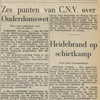The Puzzle of Dutch Welfare Solidarity and the Politics of Old Age Pension Reform (1945-1975)
DOI:
https://doi.org/10.51769/bmgn-lchr.7010Keywords:
The Netherlands, Welfare State, Christian Democracy, Labor, Middle Classes, Interest Group Politics.Abstract
During the first three decades of the post-war period, the Netherlands developed a system of welfare provision that by most standards belonged to the most equitable and solidaristic in the world. It did so under the patronage of Christian democratic governments, which are generally viewed as being predisposed to rejecting solidaristic welfare reform. The purpose of this article is to explain why the Dutch Christian democrats came to adopt such a solidaristic welfare stance during the formative post-war period of welfare state expansion. Rather than attributing this stance to electoral or strategic considerations, this article focuses on the formative role of the Christian democratic labour union movement in persuading these parties to gradually adopt a more solidaristic welfare stance.
In de eerste drie decennia van de naoorlogse periode ontwikkelde Nederland een stelsel van sociale voorzieningen dat naar de meeste maatstaven tot het meest rechtvaardige en solidaristische ter wereld behoorde. Dit stelsel kwam tot stand met steun van christendemocratische regeringen, waarvan over het algemeen wordt aangenomen dat zij geneigd zijn solidaristische welzijnshervormingen af te wijzen. Het doel van dit artikel is om te verklaren waarom de Nederlandse christendemocraten een solidaristische welvaartskoers zijn gaan varen in de naoorlogse periode, een tijdvak dat gekenmerkt werd door uitbreiding van de verzorgingsstaat. In plaats van deze houding toe te schrijven aan electorale of strategische overwegingen, richt dit artikel zich op de christendemocratische vakbeweging. Deze speelde een invloedrijke rol in het overreden van christendemocratische partijen om geleidelijk een meer solidaristische welvaartshouding aan te nemen.
Downloads

Published
Issue
Section
License
Copyright (c) 2021 Dennie Oude Nijhuis

This work is licensed under a Creative Commons Attribution 4.0 International License.
Authors who publish with this journal agree to the following terms:
a) Authors retain copyright and grant the journal right of first publication with the work simultaneously licensed under a Creative Commons Attribution 4.0 International (CC BY 4.0) that allows others to share the work with an acknowledgement of the work's authorship and initial publication in this journal.
b) Authors are able to enter into separate, additional contractual arrangements for the non-exclusive distribution of the journal's published version of the work (e.g., post it to an institutional repository or publish it in a book), with an acknowledgement of its initial publication in this journal.
c) Authors are permitted to post their work online (e.g., in institutional repositories or on their website) prior to and during the submission process.
Authors are explicitly encouraged to deposit their published article in their institutional repository.











